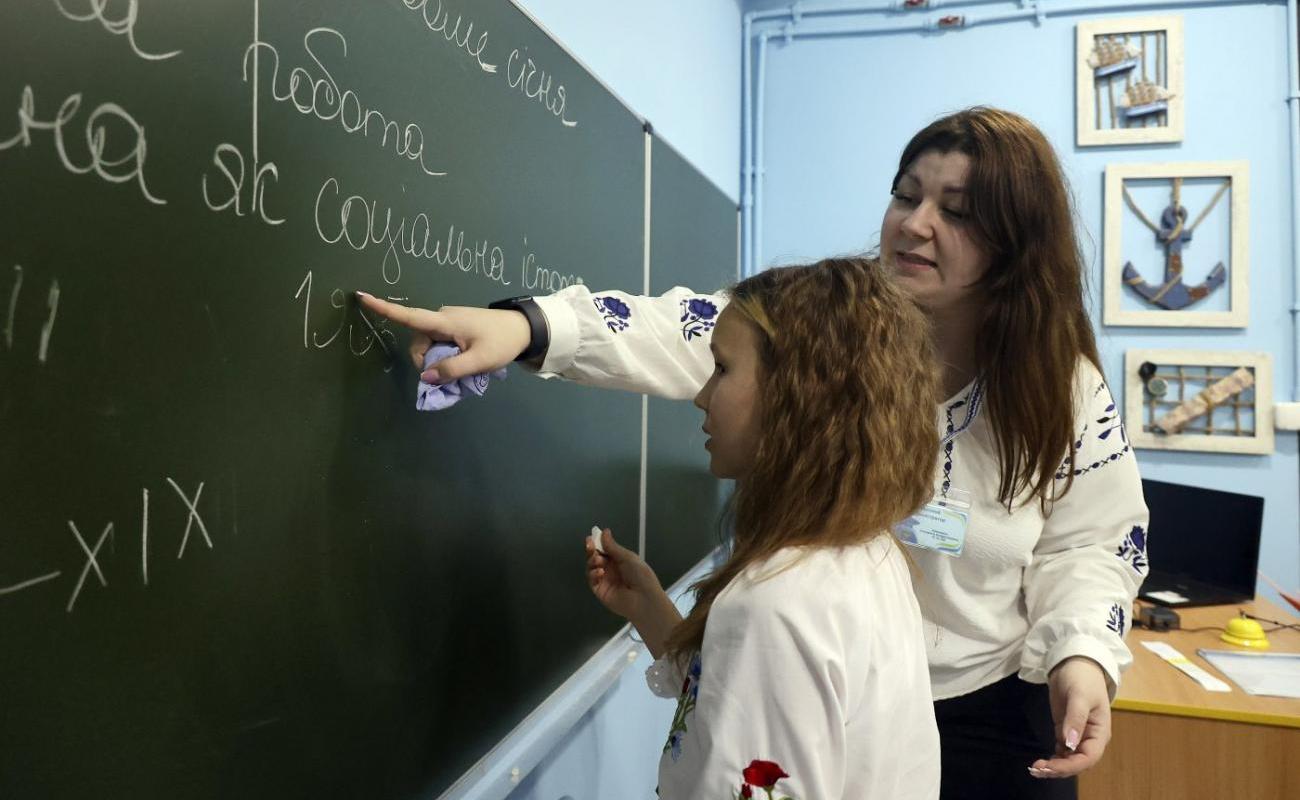Behind the Lines: Russia Bribes Teachers to Work in Occupied Ukraine

Teachers who commit to five years in communities of fewer than 50,000 people are eligible for two million ruble payouts in the occupied territories of Donetsk, Luhansk, Zaporizhzhia, and Kherson regions, and one million rubles in Crimea.
“I had a dream to see the sea,” Yulia Antonyuk, a Russian language and literature teacher who moved from the city of Omsk to the small village of Krasnohvardiiske, Crimea, told Russian TV in an interview to promote the program. “I fulfilled not only my professional goals but also found personal happiness — I got married.”
The “Zemskyi Uchitel” (Rural Teacher) program, started in 2020, was first used to attract educators to small towns across Russia, then extended to the occupied territories. When their contracts end, teachers have the choice to stay or return home.
“Four teachers who joined in the first year are still working here,” said Valentyna Akulenko, the Russian-appointed head of education for Crimea’s Sovetsky district. “This year, we are requesting four more Russian language and literature teachers — and I believe we’ll also submit a request for two math teachers.”
More than 100 teachers have moved to Crimea under the program, according to Ukraine’s Regional Center for Human Rights. Most came from Krasnodar and Altai Krai, as well as Tomsk, Novosibirsk, Saratov, Tyumen, Ivanovo regions, and Udmurtia, it said.
Alongside teachers of Russian language, literature, and history, there were also instructors for classes in “basics of life safety and defense of the Motherland,” according to Kateryna Rashevska, a legal expert at the NGO Regional Center for Human Rights.
“These classes are focused on military conscription and preparing young men for service,” she said. “These people are also involved in reprogramming Ukrainian children, attempting to raise them as Russian patriots and future members of the Russian armed forces.”
The program for the newly occupied territories officially launched in 2024, but Russian teachers had started arriving two years earlier, Rashevska said.
“We have documented cases of teachers — and people assigned to managerial roles, such as school principals and deputy heads — arriving as early as 2022,” she said. “The first group came from Dagestan, arriving in the occupied Zaporizhzhia region, and by 2024, there were already 37 teachers from Dagestan working there.”
And it’s not just ideologically driven teachers arriving from Russia to “integrate” Ukrainian children into Russian society, some are the wives of soldiers fighting in the war, who move on the promise of cheap housing for combatants in occupied areas.
Similar programs, including “Zemskyi Cultural Worker” and “Zemskyi Coach”, were launched in January with the goal of bringing culture and sports instructors to small towns and villages. Like the “Zemskyi Teacher” initiative, participants receive a two-million-ruble payment, and the goal is much more than simply filling job vacancies.
More than 200 demobilized Russian soldiers are now working in occupied Ukrainian territories as physical education teachers or instructors of “basics of life safety and defense of the Motherland,” with the explicit goal of promoting military service and recruiting Ukrainian children into the Russian army, according to the Regional Center for Human Rights.
Many arrive with their families, receive housing, and settle in — a process widely recognized as colonization in breach of Article 49 of the Geneva Convention and Article 8 of the Rome Statute.
“Russia plans to move another 100 teachers into occupied areas in 2025 — a clear example of colonization, which the UN Security Council calls a major obstacle to peace,” Rashevska said.
While Russia relocates its citizens to Ukrainian schools, Moscow is doing all it can to force Ukrainian teachers to cooperate and teach the Russian curriculum. Those who refuse are at risk of punishment and deportation.
“In Berdiansk, a school principal was deported for refusing to open the school under Russian standards,” said Mariia Sulialina, head of Almenda, a Ukrainian human rights organization. “According to the occupiers, his stance and influence also discouraged other teachers from working in Russian-run schools.”
Teachers are sent on “retraining” programs, she said, and “if a teacher doesn’t praise Putin enough during lessons, they can be fired.”
Some teachers are trying to simply teach their subjects and avoid Moscow’s propaganda, but this is becoming increasingly difficult due to strict school controls, Sulialina said.
“Teachers can be fined for failing to report ‘extremist behavior’ among students, which in practice refers to pro-Ukrainian views,” she added.
While Putin has extended the “Zemskoy Uchitel” program through 2030 and launched similar initiatives, human rights groups say it’s crucial to use the existing tools of international law to hold Russia accountable.
“There are powerful mechanisms, but they’re not being used,” Rashevska said. “The International Criminal Court still doesn’t prioritize colonization, even though these federally coordinated programs involving teachers, cultural workers, and coaches create a clear chain of command, potentially reaching top officials.”
Sanctions could also be used against those who orchestrate and promote the settlement efforts, she said. Ukrainians want the UN Independent Commission and ICC to prioritize these violations, expose them, and uphold international justice.
Elina Beketova is a Non-resident Fellow with the Democratic Resilience program at the Center for European Policy Analysis (CEPA). She is the author of Behind the Lines, a database and article series focused on Ukraine’s temporarily occupied territories. Elina began her career as a journalist in Crimea and later worked as a journalist, editor, and TV anchor for news stations in Kharkiv and Kyiv.
Europe’s Edge is CEPA’s online journal covering critical topics on the foreign policy docket across Europe and North America. All opinions expressed on Europe’s Edge are those of the author alone and may not represent those of the institutions they represent or the Center for European Policy Analysis. CEPA maintains a strict intellectual independence policy across all its projects and publications.
